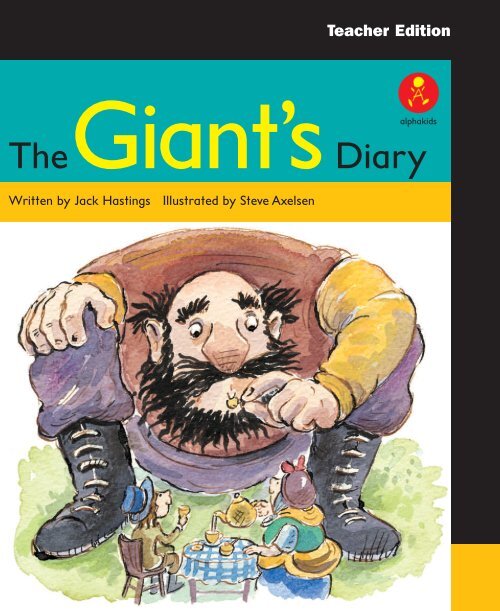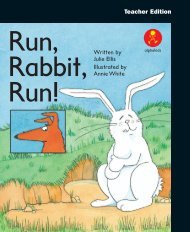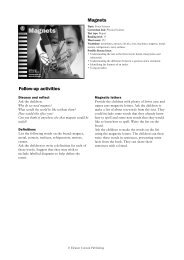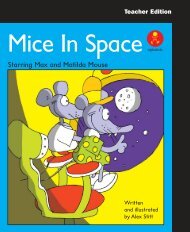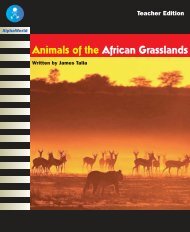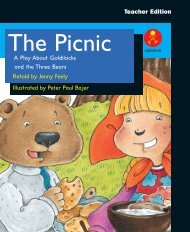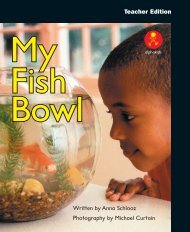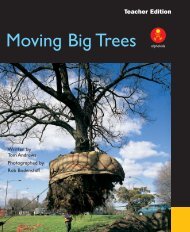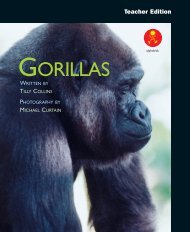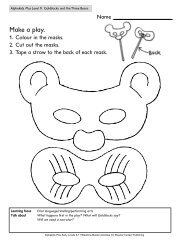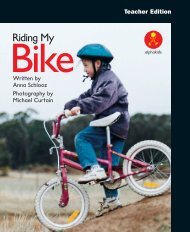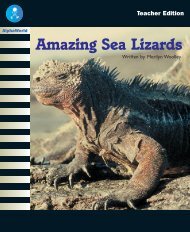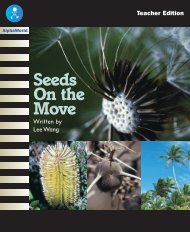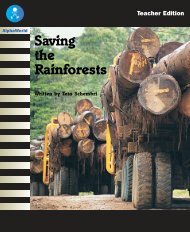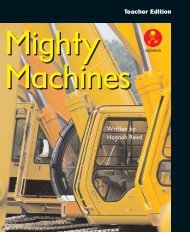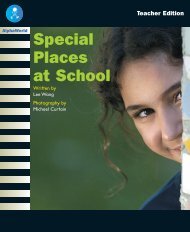The Giant's Diary
The Giant's Diary
The Giant's Diary
You also want an ePaper? Increase the reach of your titles
YUMPU automatically turns print PDFs into web optimized ePapers that Google loves.
Teacher Edition<br />
<strong>The</strong>Giant’s<br />
alphakids<br />
<strong>Diary</strong><br />
Written by Jack Hastings Illustrated by Steve Axelsen
Published edition<br />
© Eleanor Curtain<br />
Publishing 2004<br />
Text © Elizabeth Golding<br />
Photographs<br />
© Eleanor Curtain<br />
Publishing<br />
First published 2004<br />
Apart from any fair dealing for<br />
the purposes of study, research,<br />
criticism or review, as<br />
permitted under the Copyright<br />
Act of Australia, no part of this<br />
book may be reproduced by<br />
any process, or transmitted in<br />
any form, without permission<br />
of the copyright owner. Where<br />
copies of part or the whole of<br />
this book are made under Part<br />
VB of the Copyright Act, the<br />
law requires that records of<br />
such copying be kept and the<br />
copyright owner is entitled to<br />
claim payment.<br />
Developed by<br />
Eleanor Curtain Publishing<br />
Designed by<br />
Alexander Stitt<br />
Production by<br />
Publishing Solutions<br />
Printed in China<br />
ISBN 0 7253 3283 2<br />
1 2 3 4 5 6 7 8 9<br />
04 05 06<br />
How to use this book<br />
<strong>The</strong> Alphakids Plus teacher<br />
editions support teachers as they<br />
guide children’s reading and<br />
thinking during one or more guided<br />
reading sessions. Teachers can<br />
observe children as they read and<br />
choose from the given suggestions<br />
to suit individual needs.<br />
Before reading<br />
Setting the context, front cover<br />
and title page:<br />
<strong>The</strong> suggestions help teachers to<br />
set the scene and prepare children<br />
for reading the book. Prompts help<br />
to determine children’s prior<br />
knowledge. Where necessary,<br />
background information is<br />
provided. Teachers are encouraged<br />
to check that children understand<br />
the vocabulary listed and to discuss<br />
the meanings and/or the structures<br />
of these words. Previous experiences<br />
with similar text types may also be<br />
discussed.<br />
During reading<br />
Predict, Read, Reflect:<br />
Questions encourage children to<br />
engage with the text by making<br />
predictions. <strong>The</strong>y then read a<br />
section of the text and reflect on<br />
what they have read. <strong>The</strong> focus is<br />
on the content, language and text<br />
features of the book.<br />
Observe and support:<br />
Prompts help teachers to focus on<br />
the strategies children use as they<br />
read. Teachers can then select from<br />
and adapt the suggestions according<br />
to the needs of the individual child.<br />
<strong>The</strong> suggestions aim to develop a<br />
child’s reading abilities.<br />
Interruptions to the child’s reading<br />
should be minimal.<br />
After reading<br />
A selection of reading and writing<br />
activities:<br />
<strong>The</strong> last pages of the teacher edition<br />
provide follow-up activities and<br />
include the assessment focus.<br />
Selected text features<br />
• <strong>The</strong> book is written as an<br />
autobiographic diary<br />
• Days of the week are featured<br />
Vocabulary<br />
diary, excitedly, fierce, frightened,<br />
headstart, interested, polite, squawking
Setting the context<br />
If the children are not familiar with the story ‘Jack and the Beanstalk’ read it<br />
to them as it will assist them in understanding this narrative. If they do know<br />
the story, ask them to retell it.<br />
What is the giant like? What do you think he would do if he met Jack again?<br />
This book is written as a diary. What would you find in a diary?<br />
alphakids<br />
<strong>The</strong>Giant’s <strong>Diary</strong><br />
Written by Jack Hastings Illustrated by Steve Axelsen<br />
<strong>The</strong>Giant’s <strong>Diary</strong><br />
Written by Jack Hastings<br />
Illustrated by Steve Axelsen<br />
Front cover<br />
What kind of book do you think this is?<br />
Why do you think that?<br />
Ask children to discuss the picture on the<br />
front cover of the book.<br />
What is the giant doing? Who is he<br />
drinking tea with? How do you think this<br />
happened?<br />
Title page<br />
What do you think the giant is writing?<br />
What does this picture add to what you<br />
now know about the story?
<strong>The</strong> Giant’s <strong>Diary</strong> Pages 2–3<br />
Predict<br />
What do you think the giants will be like?<br />
Look at the pictures on pages 2 and 3. Why do you<br />
think the pictures of the giants are so different?<br />
Read to the end of page 3.<br />
Reflect<br />
Who is writing this diary?<br />
What do people normally think of giants?<br />
What do you think Hugo and his wife are like?<br />
Observe and support<br />
Can the child point out the features of the book that<br />
indicate that it is a diary?<br />
This book is written as a diary. Show me the features<br />
of a diary that are in this book.<br />
2
Sunday<br />
Hi. My name is Hugo Grand and I’m a giant.<br />
My wife is a giant too.<br />
People think that giants are fierce and that they<br />
love stomping around and eating people.<br />
But I’m not interested in eating anyone.<br />
And when you’re as big as I am, you can’t help<br />
stomping just a little bit.<br />
I’d love to find some friends, but people run<br />
away screaming when they see me. No one<br />
comes to visit.<br />
Life is hard for giants.<br />
2 3<br />
3
<strong>The</strong> Giant’s <strong>Diary</strong> Pages 4–7<br />
Predict<br />
Look at the picture on pages 4 and 5. What do you think<br />
the giant is doing?<br />
Look at the picture on page 6. What is Jack doing?<br />
Read to the end of page 7.<br />
Reflect<br />
Why did the giant say ‘Fee Fi Fo Fum’? What was he<br />
trying to do?<br />
Why do you think the boy stole the harp and the goose?<br />
How is the giant feeling now?<br />
Observe and support<br />
Ask one child to read aloud to you while the others<br />
are reading silently. Can the child read the text<br />
fluently?<br />
Can you read this smoothly?<br />
Assist children by modelling fluent reading for them<br />
if necessary.<br />
4
Monday<br />
Today some strange things happened.<br />
At lunch time I could smell a small boy.<br />
I think he’s been here before, but I’ve never seen<br />
him. I hoped he might have come around to<br />
make friends.<br />
I played the ‘Fee Fi Fo Fum’ game that I used to<br />
play with my father when I was little. But the boy<br />
must have been hiding and he didn’t come out.<br />
I asked my magic harp to play and my goose to<br />
lay a golden egg. But the boy still didn’t appear<br />
and my harp played so softly and beautifully that<br />
I fell asleep.<br />
4 5<br />
Suddenly, a dreadful noise woke me up.<br />
My goose was very upset and squawking loudly.<br />
<strong>The</strong> harp was shouting my name.<br />
All at once I saw a small boy running out the<br />
door with my magic harp under one arm and<br />
my goose under the other!<br />
I couldn’t believe it.<br />
I ran after him but I tripped over my shoelace and he<br />
got a good headstart. He ran all the way to the top of<br />
the beanstalk that grew from his garden on the ground<br />
up to my house in the clouds. He had reached the<br />
ground and chopped down the beanstalk before I even<br />
got to the top.<br />
I suppose he didn’t want to be my friend after all.<br />
I don’t even have my goose or my harp to play with.<br />
Now I’m lonely AND bored!<br />
6<br />
7<br />
5
<strong>The</strong> Giant’s <strong>Diary</strong> Pages 8–9<br />
Predict<br />
What is the giant doing now?<br />
What are Jack and his mother doing?<br />
Do you think the giant will try to get back his magic harp<br />
and his goose?<br />
Read to the end of page 9.<br />
Reflect<br />
What did the giant notice about the boy and his mother?<br />
Why do you think that the boy stole the harp and the<br />
goose?<br />
Observe and support<br />
Does the child integrate a range of information to<br />
solve problems when they read?<br />
How did you know that word was ‘tiny’? What did you<br />
think about?<br />
6
Wednesday<br />
This morning the boy took some golden eggs to<br />
sell at the market and came home with a cow<br />
and a big basket of food.<br />
His mother was so excited that she danced<br />
around and around the house. <strong>The</strong>n they ate a<br />
big lunch.<br />
Now I think I know why the boy stole my harp<br />
and my goose! But I still miss them.<br />
Tuesday<br />
I had nothing else to do so I spent all morning watching<br />
the boy way down there on the ground.<br />
He built a lovely house for my goose and asked my magic<br />
harp to play for his mother. She looked very happy.<br />
<strong>The</strong>y must be very poor. <strong>The</strong>ir house is tiny. <strong>The</strong>y don’t<br />
have any animals, not even a cow. I wonder where they<br />
find money for food?<br />
8<br />
9<br />
7
<strong>The</strong> Giant’s <strong>Diary</strong> Pages 10–13<br />
Predict<br />
What do you think the giant will do next?<br />
Why does he need a ladder?<br />
Read to the end of page 12.<br />
Reflect<br />
How do you think that Jack and his mother felt when the<br />
giant peeped in the window?<br />
What did the giant really want to do?<br />
Observe and support<br />
Can the child understand the literal meaning of<br />
the text?<br />
Why did the giant want to make friends with Jack<br />
and his mother?<br />
8
Thursday<br />
I have decided what to do. I’ve built an<br />
enormous ladder. I’m going to climb<br />
down to the ground and talk things over<br />
with the boy and his mother.<br />
Maybe we can share the golden eggs.<br />
Maybe we can all listen to the harp<br />
together.<br />
Friday<br />
This morning when I climbed down my ladder<br />
the goose came running towards me and the<br />
harp played excitedly. But the boy and his<br />
mother screamed and ran inside.<br />
10<br />
11<br />
I peeped at them through the window and said,<br />
‘Don’t be frightened. I just want to make friends.’<br />
I tried to speak softly so my big voice wouldn’t<br />
scare them.<br />
<strong>The</strong>y came slowly out of the house.<br />
<strong>The</strong> boy said, ‘Hello, I’m Jack. This is my<br />
mother.’<br />
He looked sad and worried. ‘Please don’t be<br />
angry,’ he said. ‘I know it was wrong to steal<br />
your goose and your harp. I took them because<br />
we are very poor and very hungry.’<br />
‘I’m not angry,’ I said. ‘I’m just lonely and bored.<br />
My name is Hugo. It’s nice to meet you.’<br />
12 13<br />
9
<strong>The</strong> Giant’s <strong>Diary</strong> Pages 14–16<br />
Predict<br />
Why is the giant having a cup of tea with Jack and his<br />
mother?<br />
How do you think that Jack and his mother will get along<br />
with the giant?<br />
Read to the end of page 16.<br />
Reflect<br />
What did the giant do to help Jack and his mother?<br />
What do you think will happen when Jack and his mother<br />
go and stay with the giant? Will the giant still be friendly?<br />
Observe and support<br />
Can the child identify compound words? (firewood,<br />
tiptoe)<br />
What is a compound word? Show me a compound<br />
word on this page.<br />
10
‘What a polite giant!’ said Jack’s mother.<br />
‘Would you like a cup of tea?’<br />
‘Yes, please!’ I said. ‘I’d love a cup of tea!’<br />
After morning tea, I helped Jack collect some<br />
firewood. I walked on tiptoe so that the ground<br />
wouldn’t shake.<br />
We fixed a hole in the roof of the house.<br />
I helped his mother in the garden. I was careful<br />
not to step on her vegetables.<br />
I learned how to milk the cow.<br />
We talked about lots of things and had a<br />
wonderful time.<br />
14 15<br />
Next weekend Jack and his mother are going to<br />
come and stay with me and meet my wife.<br />
We’re going to share the goose and the harp.<br />
Life is good for some giants, don’t you think?<br />
16<br />
11
After reading<br />
Being a meaning maker<br />
Encourage the children to support<br />
their answers with evidence from<br />
the book as they discuss these<br />
questions:<br />
Why did the giant build a giant<br />
ladder?<br />
How did Jack and his mother feel<br />
when they saw the giant near their<br />
house?<br />
Why did the giant decide to share<br />
his harp and goose with Jack and<br />
his mother?<br />
What would you have done if you<br />
were the giant?<br />
Being a text user<br />
What kind of book is this?<br />
Who is telling the story?<br />
Discuss the features of a diary.<br />
Why are the days of the week at<br />
the top of some pages? What does<br />
this tell you about the book?<br />
Being a text critic<br />
In this book the author shows us<br />
that the giant is a kind person who<br />
is just lonely. Do you think this is<br />
true? Why?<br />
Were you happy with the way the<br />
story finished? Why?<br />
Being a code breaker<br />
Explore the following language<br />
features:<br />
• contractions: I’m, we’re, you’re,<br />
can’t, I’d, he’s, I’ve, didn’t, couldn’t,<br />
don’t, it’s, wouldn’t<br />
• letters used to represent the soft<br />
‘j’ sound in the book: giant, Jack,<br />
strange, magic, just<br />
12
Responding to text<br />
Create a play based on ‘<strong>The</strong><br />
Giant’s <strong>Diary</strong>’. Children<br />
work in cooperative groups to write<br />
a script for their play. <strong>The</strong>y will<br />
need to discuss the characters, what<br />
they will say, whether they will have<br />
a narrator, sets, props, etc. Give<br />
children plenty of time to prepare<br />
and then present their plays to the<br />
class.<br />
Compare the traditional<br />
story of ‘Jack and the<br />
Beanstalk’ with ‘<strong>The</strong> Giant’s <strong>Diary</strong>’.<br />
What is the same and what is<br />
different? Ask children to write<br />
about these and share them with<br />
the class.<br />
Locate all the contractions in<br />
‘<strong>The</strong> Giant’s <strong>Diary</strong>’. Write<br />
these onto cards showing the word<br />
as a contraction and as two words.<br />
For example: don’t = do not.<br />
Children work in pairs to make and<br />
then play the memory game with<br />
these words.<br />
Writing links<br />
Shared writing<br />
Discuss with the children how the<br />
story was written from the giant’s<br />
point of view. Read ‘<strong>The</strong> True Story<br />
of the Three Little Pigs!’ by Jon<br />
Scieszka. This was written from the<br />
wolf ’s point of view.<br />
Independent writing<br />
Ask children to write diaries from<br />
the point of veiw of a character<br />
from another folk tale, e.g. from the<br />
perspective of the big bad wolf in<br />
‘Little Red Riding Hood’.<br />
Possible assessment focus<br />
Can the child:<br />
• point out features of the book that indicate this is a diary?<br />
• say why the giant wanted to make friends with Jack and his mother?<br />
whole text activity sentence activity word activity
alphakids<br />
alphakids<br />
alphakids<br />
alphakids<br />
alphakidss<br />
alphakids<br />
<strong>The</strong>Giant’s <strong>Diary</strong><br />
Written by Jack Hastings Illustrated by Steve Axelsen<br />
Teacher<br />
Edition<br />
Other<br />
books<br />
at this<br />
level<br />
<strong>The</strong> Boy<br />
Who Wanted to be<br />
Famous<br />
Written by Claire Halliday Illustrated by Bettina Guthridge<br />
Topic: Problem solving<br />
Curriculum link: English<br />
Text type: <strong>Diary</strong><br />
Reading level: 22<br />
Word count: 744<br />
Vocabulary: diary, excitedly, fierce, frightened,<br />
headstart, interested, polite, squawking<br />
I Want to Be an<br />
Acrobat<br />
Written by Tom Andrews<br />
Photography by Ross Tonkin<br />
Moving Big Trees<br />
Written by<br />
Tom Andrews<br />
Photographed by<br />
Rob Bodenstaff<br />
Possible literacy focus<br />
Exploring the features of a diary.<br />
Understanding character motivation.<br />
Social<br />
Insects<br />
Written by Keith Pigdon<br />
Dragons<br />
Written by Jenny Feely<br />
Summary<br />
This book is an innovation on the folk tale ‘Jack and<br />
the Beanstalk’. In this version the story is told from<br />
the point of view of the giant, who is lonely. <strong>The</strong><br />
giant visits Jack’s house to make friends with Jack<br />
and his mother.<br />
ISBN 0- 7253- 3283- 2<br />
9 780725 332839<br />
alphakids


